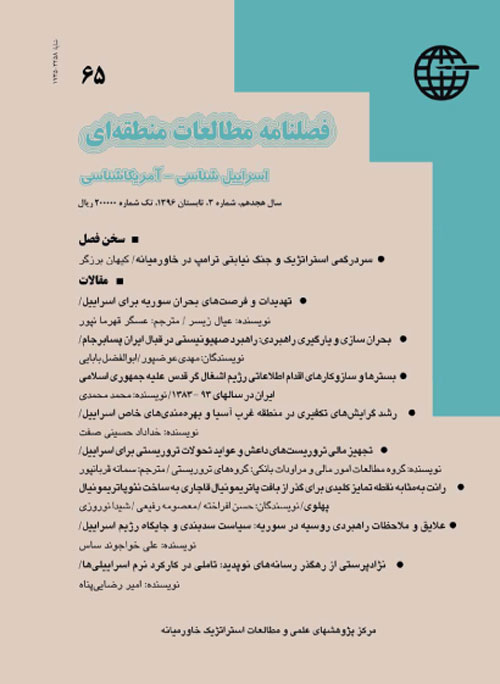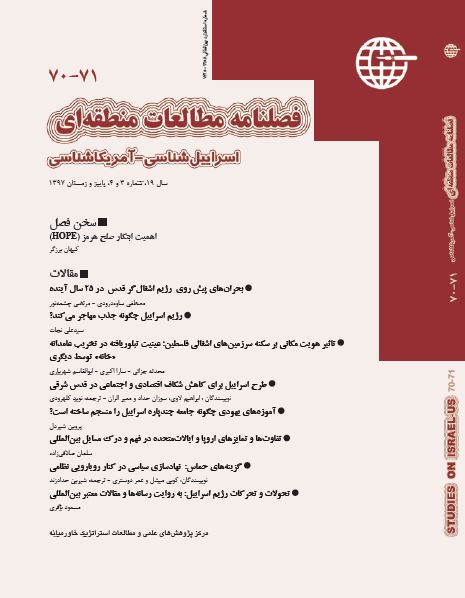فهرست مطالب

نشریه مطالعات منطقه ای
سال هجدهم شماره 3 (تابستان 1396)
- اسراییل شناسی - آمریکا شناسی
- بهای روی جلد: 200,000ريال
- تاریخ انتشار: 1397/05/25
- تعداد عناوین: 9
- سخن فصل
- مقالات
-
Page 1and investigates benefits and losses of the terrorist group to Israel. During the Arab Spring, Syria faced widespread protests and gradually faced ISIL's military operations with ISIL's power over its homeland. The expansion of the military confronts the country, with the split and isolation, which created internal crises and international intervention through ISIL. As a result, this Syrian war was divided into various sectors dominated by opposition and government. Although the central government of Syria, after several years of civil war, has been able to regain its power over a large part of the country, Israel now finds itself in a situation where it poses the question. To what extent does the status of Syria's government and its future power affect Israel's security? To address this issue, Israel is seeking to establish a coherent policy with the help of Arab countries, such as Saudi sheikhs and other moderate countries, in order to prevent future risks in a larger framework.Keywords: Israel, Syria, Threat, Saudi Arabia
-
Page 21Since the victory of the Islamic Revolution in 1979, Iran has considered the Zionist regime to be an illegitimate regime. Israeli leaders also did not hesitate to try to undermine the Islamic system by understanding the anti-Zionist nature of the Islamic Revolution. Hence, the Zionist regime sees Iran as an existential, endangered and endangered threat. In this context, Zionist regime has, in recent years, emphasized the threat of Iran's nuclear program, putting pressure on Iran in the international community. The Zionist regime has adopted various strategies for Iran prior to the 2015 nuclear deal, but the main question of the current study is what will be the coordinates of the future Zionist strategies for Iran's nuclear program? Will the Zionist regime continue its previous strategies against Iran, or will it make changes in its strategy towards Iran in the context of the new situation?Keywords: Zionist regime, Islamic Republic of Iran, Iran's nuclear program, nuclearagreement, structural neoliberalism
-
Page 45In every country, national security is dependent on a set of internal developments and events in its security environment. The Islamic Republic of Iran is one of the countries that during the 37 years since the victory of the glorious Islamic Revolution under the
leadership of Imam Khomeini have been experienced tremendous developments which by analyzing the intelligence and security measures against Iran, the traces of Quds occupying regime in most of these anti-security measures against Iran are quite
obvious. Therefore, in this research, we seek to study bases and mechanisms of intelligence of attempts of Quds occupying regime against the Islamic Republic of Iran from 2004 to 2014 as the main concern of the research which could be considered for
Iran as a threat or concern from this regime. The result of this Impact on the national security of the Islamic Republic of Iran, and then make appropriate proposals in this regard. In this research, an interpretive analytical method and deep dialogue have been used.Keywords: Islamic Republic of Iran, Quds Occupying regime, bases, mechanism, national security, intelligence, intelligence action -
Page 85The ISIL group, which is one of the most radical Salafist groups in recent years, has introduced itself to the world under different titles, such as the Islamic State of Iraq and the Levant (ISIL) or the center of the Islamic Caliphate, or the Islamic State, and has appointed Abu Bakr al-Baghdadi as Caliph All the Muslims of the world have chosen their leader and have asked all Muslims to swear allegiance to them. By seizing Mosul in 2013 and invading Iraq and capturing almost half of Iraq's land, ISIS took its military power to the face of the world, albeit with opposition, Iran and several Western countries and the Shiite authority of Iraq were with them. After a while, however, they
stopped but, with this, ISIL, with all sorts of propaganda, tried to attract forces from all over the world among the Muslim youth, and we saw ISIS getting involved with most Islamic and non-Islamic countries, among them the Kurdistan region, including the northern Kurds Iraq and western Iran have been targeted by the ISIL propaganda media to attract Kurdish youth who seem to have succeeded in some way in recruiting forces especially in Iraqi Kurdistan, but have not been able to penetrate or succeed in recruiting among the Iranian Kurds.Keywords: Takfiri tendencies, West Asia, Israel -
Page 113During the period of ISIL's dominance in part of Iraq and Syria, this terrorist organization received several sources of income and financial resources, including the sale of oil for smuggling large donations of supporters, illegal activities such as the theft of banks, confiscation of property Various Sunni and Christian Shiite groups and government officials. One of ISIS's major sources of financing terrorist acts was the plunder of the Iraqi and Syrian museums, which earned money by removing the historical objects of these countries and selling them to the anti-trafficking market. Although ISIL has failed today, it still puts a portion of its revenues from various sources to cover the operations of this terrorist organization in different countries.Keywords: ISIL, oil, Israel, terrorist acts
-
Page 129
Written by: i
The continuity of economics and politics is something that today clearly leads to
complexities in the development and advancement of countries, which are sometimes
facilitators and sometimes problematic. But in the meantime, geographical conditions as
the third pillar of triangle seem to determine shape and process of both economic and
political variables. This paper examines the Iran’s country at the time of Qajar to
Pahlavi with these three variables. The issue of water scarcity, livelihoods and
economic life necessitated the presence of a powerful patrimonial and Patrimonial
employed an economically dependent and unproductive economic system to maintain
and execute its costly roles.It seems that the rents that has led to the survival of Rentier
governments is also ongoing in Israel. US-backed aid to Israel has the same role as oil
in Rentier governments.Keywords: Patrimonialism, Neopotrimonialism, Rents, Rentier Economics, Strategic Rent -
Page 151Russia is one of the most important powers in the Syrian crisis. The country's policy toward the Syrian crisis in supporting strategic partner and Russia's emphasis on the policy of action in a multipolar world and avoiding the monopolization of the world has had a dramatic impact on the developments in Syria and the positions of other countries.Keywords: Realism, the Syrian crisis, Russia.
-
Page 177Media is a powerful means of transferring data and meanings. They have a great potential in shaping the mindset and thought of their audience. Israel is an ideological country that uses mass media to distribute and instill the center of its political ideology, ethnic and racial superiority. Israeli media are continually seeking to reproduce the hidden discourse behind the political ideology of Israel, centered on Zionist racism. The article follows the relationship between political ideology and mass media in Israel, and it follows that the "Israeli media are the essential means of reproducing Israel's political ideology, Zionist racism.


